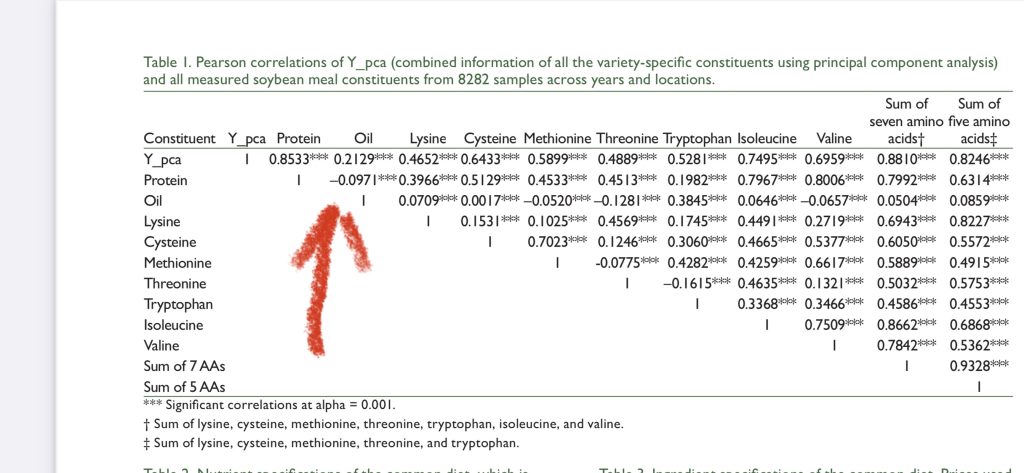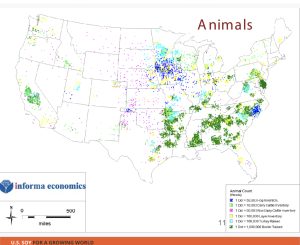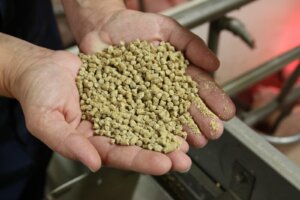The “food vs. fuel” debate must be revisited with soybean biodiesel because while food-for-ethanol is an even trade, that’s not true with soybeans. It’s ‘food and fuel’ with soybeans. Therefore, the 131-group checkoff reform movement should add protecting protein value of the world’s commodity soybeans and corn to its list of improvement ideas. More protein and oil per acre will speed success with multiple sustainable development goals.
Situation Overview:
With soybeans, the oil is crushed out and used mostly for fuel. The soybean meal is used mostly for livestock feed. Soybean protein is inversely correlated with soybean oil. Therefore, a plan is needed to ensure climate policies don’t harm food, health, economies, or ecosystems.

Soybean protein and oil are inversely correlated, making a plan necessary to protect food security. Click image for journal article.
Commodity soybean and corn nutrient value have declined for 20 years – since biotechnology debuted. The skyrocketing demand for more biodiesel naturally drives down soybean protein faster. Losing soy nutrients leads to lower production efficiency, and plowing more South American rainforests to feed people.
USA exports about 60 percent of its soybeans, with about 90 percent shipping to China. The country’s increasing prosperity drives more meat consumption. India is predicted to follow China and drive soybean and corn demand even higher. That means getting biofuel and food policies aligned with soybean physiology is a global food security imperative.
Seed-to-Feed Solutions:
Shared solutions start with seed breeding and feed selection to match protein and oil with local market needs. For example, maximizing soybean protein in the Upper Midwest, where 90 percent of U.S. pigs are raised, matches how nature puts resources where they’re needed.

This map shows where protein is needed for U.S. livestock. About 90 percent of pigs are raised where protein is lowest.
Including maximum protein and oil as a seed selection criteria naturally improves soybean value, boosts exports and local feed corn demand, and improves livestock emissions. Increasing protein in the Upper Midwest will help reduce ecosystem destruction and supply food needs worldwide.
The food-and-biodiesel policy is possible to implement because just two companies control most of the biotechnology licenses: Corteva Agriscience and Bayer Crop Science. The United Soybean Board, NCGA, and livestock groups should immediately mobilize farmers to boost protein in biotechnology-enhanced commodity seed. The four processors who buy most of the world’s grain should compensate family farmers fairly for delivering higher quality, like buyers do with wheat, meat, vegetables, or coffee.
To help speed adoption curves, communications firms and NGOs should promote protein, and help everyone learn about the natural connections between farm and urban interests
Regulatory Reform Needed:
Given the financial and communications resources of the checkoff system and multinational seed companies to protect commodity crop nutrition and speed sustainable development goals, the US Congress should act quickly to protect the public.
Reform is needed because the soybean checkoff has massaged facts about soybean value for years. USB recently blocked re-release of farmer-funded soybean protein and oil data which Proactivism.com requested, saying re-release “would hurt farmers and the checkoff.” That data was published for years, and seed companies supported the program to make soybean value clear. Here is that program status today: www.soyvalue.com.
The checkoff has rejected reasonable improvement ideas from 131 diverse groups that can help improve the checkoff, protect farmers, and feed people. Recovering protein and protecting food from biofuel and DDGS (ethanol coproduct) should be added to the group’s list.
https://farmactionfund.us/wp-content/uploads/2023/03/OFF-Act-Letter.pdf
Ecosystem Science Support:
1. Soybean feed and oil value can be controlled at the variety level: https://proactivism.com/wp-content/uploads/2023/01/aj-0-0-agronj2017.11.0624.pdf
2. Increasing soybean protein naturally reduces livestock emissions: https://proactivism.com/wp-content/uploads/2023/01/AOCS-poster-Final.pdf
For more information about a grassroots program to protect soybean protein and oil value, please visit proactivism.com. Thanks!









Leave A Comment